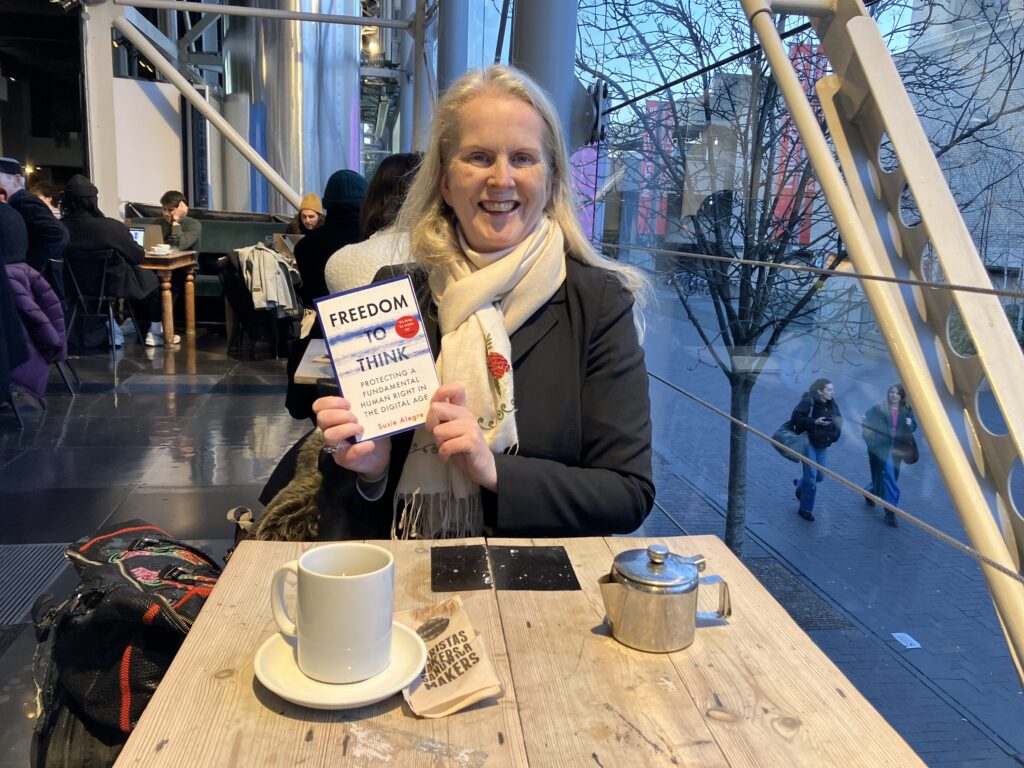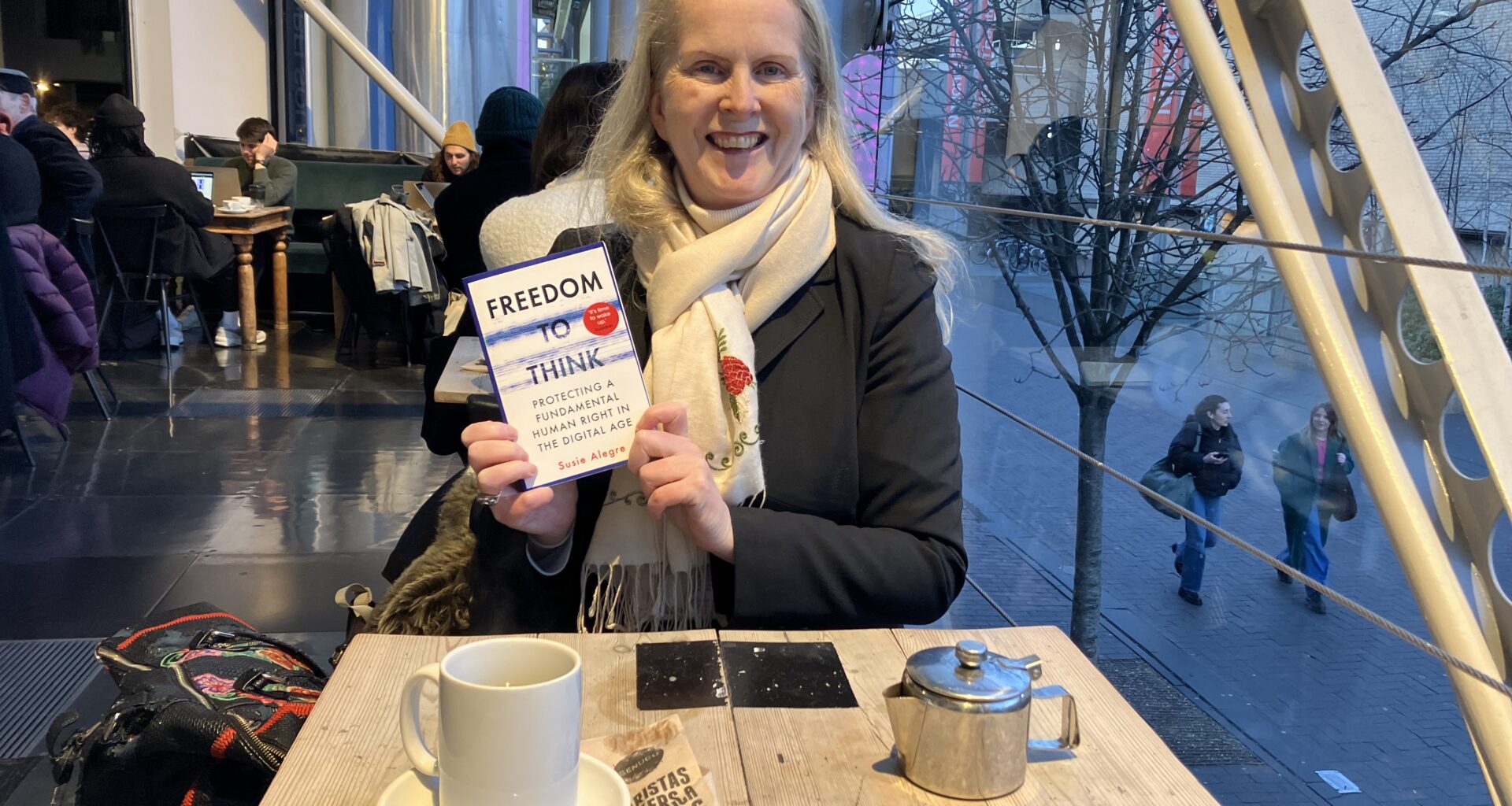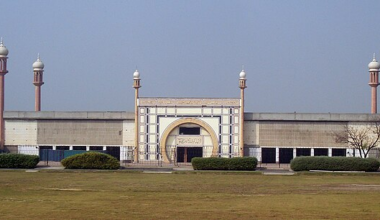
Introduction
In the last few years, researchers in several disciplines have become increasingly interested in the topic of free thought, its status as a human right, and its prospects of survival. Notable among the literature is Susie Alegre’s Freedom to Think: Protecting a Fundamental Human Right in the Digital Age, published in 2022. This was followed in 2023 by The Battle for Thought: Freethinking in the 21st Century, by Simon McCarthy-Jones – who has also given an interview to the Freethinker, to be published shortly.
Susie Alegre is an international human rights lawyer, author and deputy High Court judge. During her career she has worked in many challenging areas of human rights law, including counter-terrorism and extradition, anti-corruption measures in Uganda, and surveillance technology. Her latest book, Human Rights, Robot Wrongs: Being Human in the Age of AI, will be published on 2 May.
I met Alegre at the café at the back of the British Film Institute, on London’s South Bank. In the interview below, we discuss how she became interested in freedom of thought and why it matters, as well as its legal definition and relationship to freedom of expression. We also examine the problems which modern technology poses to our ability as individuals to resist manipulation, in a digital world which is designed to do just that.
~ Emma Park, Editor
The Freethinker: How did you come to your recent interest in digital technology and human rights?
Susie Alegre: After studying French and Philosophy at university, I came to the law in my late twenties. I spent two years living in Spain, where I first started working on conflict resolution issues in the Basque country. That was my first introduction to human rights law in practice, and showed me how the law can change society, and be used to protect people. After that, I came back to the UK and did my training as a barrister in the European Commission, and also briefly in the Council of Europe, which is where the European Court of Human Rights is, before coming back to practise in crime and extradition. One of the reasons I was attracted to crime was that it is the sharp end of the law, where the decisions being made affect people dramatically.
When I qualified in 1997, the Human Rights Act had not yet been passed, so going into practice as a ‘human rights lawyer’ as such was not a practical option. You could be interested in human rights, but when you were standing up in the Crown Court, you could not cite human rights to your average judge. I pivoted after a couple of years into policy, because policy was where you could really work with human rights law to change the ways our laws apply. By then, the Human Rights Act (1998) was up and running. I went to work for Justice, a UK-based human rights and rule of law organisation, on the Extradition Act 2003. I then worked for Amnesty International and other international organisations, including the UN and EU, and briefly as an ombudsman for the Financial Ombudsman Service.
I had come to work increasingly on issues related to technology, including the development of surveillance technology and the use of technology at international borders. But even though I worked on data protection, I had not really understood its fundamental importance until I first learnt about the Cambridge Analytica scandal in 2017.
When I read about how data had been used to profile people, to understand their personalities, and to use that information to target them through social media, in order to change the way they thought or the way they behaved, it struck me that this was not a data protection question – or only in so far as data protection is a gateway to getting inside our minds. That set me off on a one-woman exploration of freedom of thought, as it was back in 2017. It also chimed with my earlier study of philosophy. When I started talking to people about freedom of thought, many were interested in it from a philosophical perspective, but there was almost nothing legal that you could find about it, despite its being included in the Human Rights Act.
That set me off on a one-woman exploration of freedom of thought…
Freethinker: Has a lot been written about freedom of thought since 2017 from a legal perspective?
Alegre: Yes. It has become a burgeoning area of interest among academics, including philosophers, psychologists and lawyers, who try to understand how the right can be made real and effective, but also to ask what it should mean, and what its limitations should be in practice. The right to freedom of thought has also appeared in international law instruments. The first example of it in international jurisprudence, I believe, was with the UN Committee on the Rights of the Child, who wrote a ‘general comment on children’s rights in the digital environment’ in 2021, which talks about children’s right to freedom of thought and how that could be affected by their engagement with technology and the use of algorithms in profiling.
Freethinker: Does Article 9 of the European Convention on Human Rights (on ‘freedom of thought, conscience and religion’) cover freedom of thought in your sense?
Alegre: Yes. The two relevant articles are Article 9 and Article 10 (which covers freedom of opinion and freedom of expression). There has been much academic discussion about the difference between freedom of thought and freedom of opinion or belief. The answer is completely unclear – there is not really any case law. You could argue that it is an academic question; that, ultimately, ‘opinion’ is a slightly more developed or more coherent thought, whereas ‘thought’ is pretty much anything that might be happening in your inner life. The UN Human Rights Committee has said that this inner aspect of thought or belief is protected absolutely in international law.
There has been much academic discussion about the difference between freedom of thought and freedom of opinion or belief. The answer is completely unclear.
Freethinker: Whereas as far as freedom of expression goes, there are limitations.
Alegre: Exactly. What you can say or how you manifest your opinions or beliefs can be limited. But in the American Convention on Human Rights, which has been ratified by many Latin American countries (but not the US or Canada), ‘freedom of thought and expression’ are included together in Article 13, while ‘freedom of conscience and religion’ are covered by Article 12. Thus the question whether thought is distinct from opinion is a bit academic.
Freethinker: In your book you mention various historic texts, including John Stuart Mill’s On Liberty (1859), which is also a foundational text for the secularist, humanist and freethinking tradition in Britain. Do you think that On Liberty is still important for freedom of thought today?
Alegre: Yes. It is a key milestone in the development of thinking about freedom of thought and freedom of speech. Mill perceived that our freedom of thought can be curtailed by the pressures of society, in some cases more so than by draconian laws. Many European countries have much stronger legal restrictions on freedom of speech than we have in the UK. But even back then, Mill argued that Victorian prudery cast a much deeper pall over freedom of thought than, say, the official laws against criticising the government in France.
Freethinker: Would you agree that George Orwell is another important figure in this tradition?
Alegre: Yes, from a twentieth-century perspective, in terms of literature, George Orwell’s 1984 is important, and Aldous Huxley’s Brave New World (1932). Those two books together illustrate different aspects of thought control. Whereas Orwell is concerned with authoritarian state control, Huxley is talking about control through pointless pleasure. Both have relevance for us in the twenty-first century. There is also Philip K. Dick’s Minority Report (1956), where inferences are made about people’s thoughts and used to prevent them acting, and The Hood Maker (1955), a short story of his about the importance of being able to effectively put a ring fence around your mind in order to prevent people from reading your thoughts. Ironically, these dystopian twentieth-century works of fiction have almost acted as a template for the ways that technology has been developed and used since then, rather than as a cautionary tale.
Ironically, these dystopian twentieth-century works of fiction have almost acted as a template for the ways that technology has been developed and used since then.
Freethinker: Speaking as a lawyer, how would you define freedom of thought and the right to freedom of thought?
Alegre: Freedom of thought has two aspects. The inner aspect, the forum internum, is protected absolutely: you can think whatever you like inside your head. The outer aspect is whether you are manifesting a religion or belief or expressing yourself effectively: expression is the outer aspect of freedom of thought and opinion. The ‘inner’ aspect is a lovely philosophical idea. But in the law, you need to know what exactly it means, how you protect it, and what you need to guarantee it.
The three key elements for the protection of freedom of thought identified by legal academics are: (i) the right to keep our thoughts private; (ii) the right not to have our thoughts manipulated; and (iii) the right not to be penalised for our thoughts alone. That first aspect connects to the other two, because if people know what you are thinking or think they do, they can manipulate you more easily, and take action to penalise you on that basis.
The drafters of the Universal Declaration on Human Rights recognised that inferences about what you are thinking can be as vital to freedom of thought as actually knowing your thoughts. I talk in the book about historical witch trials. If you are sitting in a Scottish village in the seventeenth century, and the Witchfinder General turns up and makes an inference about your being a witch based on the wart on your nose and the fact that you have a black cat, you are probably going to get burned at the stake, because the authorities are making inferences about you based on your personal data, regardless of whether you ever had a witchy thought or did anything that might ever be described as witchcraft in your life.
Inferences about what you are thinking can be as vital to freedom of thought as actually knowing your thoughts.
Similarly, today, our data is being sifted and analysed by companies so as to make inferences about how we think, what kind of people we are, what our interests are, and how we might be manipulated – or indeed, how we might be penalised. In financial services, your data is used to analyse whether you are a risky kind of a person, without necessarily providing any direct evidence to suggest that you are risky.
Freethinker: How far can freedom of thought and freedom of expression be separated?
Alegre: That is an important point. You cannot be penalised for your thoughts alone. It is what you do that matters, in legal terms. Freedom of thought gives you the space to reflect and decide not to do something stupid, illegal or dangerous. That is why, from a legal perspective, it is important that you are judged on what you do or say, not on what people think you might think or believe.
Freethinker: Is it possible to have freedom of thought without a very large degree of freedom of expression, which enables people to exchange ideas, disagree, change their minds?
Alegre: No. That is why the distinction between Articles 9 and 10 is academic. It is artificial. Article 10 includes freedom of opinion, expression and information. Those three operate together. While you might be able to limit access to information, for example, in the interests of national security, you need a degree of reliable information in order to have freedom of thought. If you cannot access reliable information, then you cannot think freely. That goes back to the manipulation question: whether you are being starved of information or being given a warped version of information that is effectively manipulating your thoughts and not allowing you to think freely.
Freedom of thought also allows you to decide whether it is safe to say what you really think, to whom it is safe to say it, how it is safe to say it, and in what circumstances.
If you cannot access reliable information, then you cannot think freely.
Freethinker: What do you see as the main challenges to freedom of thought today?
Alegre: The reason why there has been a huge development in data protection law and privacy law in the last twenty years is because our data is being used in ways and on a scale that it never was before. Technological innovation is increasingly gathering our data in order to understand who we are, to make inferences about how we are thinking and feeling, and to use that information to change us. They are selling a service that provides insights into our forum internum in order to manipulate it, and so change how we behave. Therefore, freedom from manipulation is crucial, because manipulation can make you do things that you would not have done otherwise.
Freethinker: I suppose that advertising, propaganda, marketing and campaigning are all ways of manipulating your mind. Every organisation of any size these days has a public relations team or press office. Do we ever receive any information that is not manipulated in some way?
Alegre: Well, it is all designed to affect our behaviour. The question is where it crosses the line between legitimate influence and unlawful manipulation.
Freethinker: Where would you draw that line?
Alegre: It depends on the context – it is always fact-specific. It would be a trap to think that there is some magical line that applies in every circumstance.
Advertising today is very different from that of the last century. Advertising online is based on data about our individual personality, our interests, and on real-time data about how we are feeling. That means that adverts can be tailored and targeted to hit us as individuals in particular emotional states. That is very different from walking past a billboard that is designed to persuade a certain demographic – it is about advertising that is using insight into our forum internum to actually change it.
This approach is similar in a way to subliminal advertising, which is banned in Europe, even though it has not been proved that it works. Clearly, in Europe, they recognise the dangers of manipulation. Having come out of the Second World War and the Nazi propaganda machine, they recognised that this technique could not be acceptable.
Freethinker: Is there a question of consent here? Take advertising on social media. We might tick a box saying we agree to their harvesting our data, but we do not really know what this involves.
Alegre: I do not think that people are consenting in such cases, because nobody really understands what the consequences are. I have written a book about it, but I do not really know where my data is going or how it is being used, either in online advertising or elsewhere. The Irish Council for Civil Liberties issued a report last year, showing that personal data, including location data from US and European judges, the military and politicians, were being sold on the open market to China and Russia. What happens to your data once it has been harvested is unclear, but it is certainly open to exploitation – and not only commercial exploitation.
I do not really know where my data is going or how it is being used.
Freethinker: Given that the internet is now an intrinsic part of our lives, and an enormous amount of data about us is online, what can we do to this to stop this leakage of information?
Alegre: As individuals, it is very hard. You can stop what you post, but recent research shows that just by the passive use of your smartphone, anyone getting hold of it can run analytics to get a profile of what kind of person you are, how you are feeling, what your interests are. All of that information is easily accessible, so you cannot switch it off – unless you go completely cold turkey offline, but frankly, that probably puts you in a particular profile in itself.
Freethinker: Isn’t the reality that most of us can no longer afford to live offline?
Alegre: Yes – even to get a doctor’s appointment, or access your bank, it is very difficult to operate offline now. That does not mean we should despair. There are things you can do to limit your data trails, like using privacy friendly search engines such as DuckDuckGo. You can avoid having your phone with you all the time – if you are at home, you can switch it off. You can limit how much information is going in. But it will not change the fundamental problem.
However, there are ways that law can change the fundamental problem. There have been cases in Europe that challenge the legality of the whole online advertising business model. The European Data Protection Board found that Meta’s model was unlawful under existing European GDPR laws. The question then is, how do you enforce these laws against powerful tech companies?
Freethinker: Another thing you discuss in your book is technological developments which allow people’s emotions to be monitored through cameras and other devices – for example, the monitoring of children’s emotions in a classroom. How far advanced is that technology, and how much of a threat does it pose to freedom of thought?
Alegre: It is a huge threat. It is called emotion recognition technology, and it is being used in lots of different areas. There are companies in Spain that sell emotion recognition technology for shops. It could also be used in education and in the workplace. It is probably illegal once you apply the Human Rights Act to existing legislation. It needs to be banned because it is a clear use of technology to try to read people’s minds, which violates their ability to keep their thoughts private. Emotion recognition technology in education and the workplace is now prohibited under the EU’s new AI Act.
Emotion recognition technology … needs to be banned because it is a clear use of technology to try to read people’s minds, which violates their ability to keep their thoughts private.
Freethinker: How effective is the technology at the moment?
Alegre: It is difficult to know how effective it is. It reminds me of Orwell’s ‘telescreen’ in 1984. In that kind of environment, you would learn to keep a bland, contented look on your face regardless of what you were thinking. It would have a chilling effect on what you would want to think, because you would be afraid that your thoughts could be read.
Freethinker: In the literature of the twentieth century, we often see the metaphor of individuals as cogs in a great machine. Today, it seems as though companies which harvest our data view us as little more than collections of data of greater or lesser commercial value. Is this not an inhuman and inhumane way of looking at people? And is social media designed to slot people into these different data sets?
Alegre: Yes. The idea of profiling is to be able to target you with rubbish that will keep you online so that you are easier to sell stuff to, which is why it is so hard to put your phone down. It is not you, it is the design of the phone. The design of social media is there to maximise your data and attention hours.
Coming back to freedom of expression, for me, the question raised by social media is not the content of what is said, it is the manner in which it is distributed. When data on you identifies whether or not you are someone who is susceptible to conspiracy theories, then if you are susceptible, you will be served up more conspiracy theories. It does not matter if the guy in the pub thinks the earth is flat and whispers about it in the corner; but if people are being monetised as vulnerable to specific messages, then the way those messages are delivered to them and the volume of those messages will affect their freedom of thought.
In my view, the arguments about freedom of expression are mostly red herrings. The problem is the use of data and the algorithms which push people in certain directions. The people who are interested in shouting loudly and being controversial are then driven to become even more extreme, because doing so allows them to harness those algorithms.
The arguments about freedom of expression are mostly red herrings. The problem is the use of data and the algorithms which push people in certain directions.
Freethinker: Would you also say that there is danger in the fact that, say, Google or Twitter can themselves censor things that they do not want to be published?
Alegre: Yes. It is about this kind of complete control. There is corporate capture of our information environment – there is no question about that. If you look at it from the freedom of thought perspective, you do not have to get bogged down in whose thoughts are right. It is more about the system and the ability to use our data to get inside individuals’ minds, capture our attention and monetise it.
Freethinker: Artificial intelligence has made rapid strides in recent years. What dangers does it pose to freedom of thought?
Alegre: AI poses lots of dangers. Firstly, AI is already seriously polluting the information environment because it is unreliable – it makes stuff up. It is everywhere on the internet – it is almost as if the internet is eating itself. The use of generative AI for writing, drawing and other types of creation risks curtailing our ability to think for ourselves. There is research about predictive text and how that limits your vocabulary or how you express yourself, because users become lazy.
There is a real danger that if people rely on these kind of tools, we will literally forget how to think for ourselves. That will have consequences not only for our vulnerability to manipulation, but also our sheer ability to survive. What happens if the lights go out and we cannot work anything out? For instance, there is increasing evidence that using GPS leads to reduced spatial awareness and even changes the shape of your brain. If you extrapolate from GPS and imagine what would happen if all of our critical thinking faculties were run using prompts, I think that is a huge danger.
Freethinker: Is there something to be said for detox periods in which you could just switch everything off?
Alegre: Honestly, I’m desperate to do that. It is something that we can learn. I use an app called Freedom, which allows me to effectively switch my phone off for periods of time, so that I can still get texts or receive calls, but everything else is off. When I have to concentrate, I use this app, because otherwise I cannot stop myself reaching for my phone – because that is what it is designed for. But once you click on the app and block everything, then your automatic reflex to reach for your phone gradually goes away, especially if you do it over long periods of time.
Freethinker: So perhaps we just need to change our habits and relearn the idea that being immediately contactable at all times is not absolutely necessary?
Alegre: Exactly.
Freethinker: Speaking as an author and lawyer, do you think it is possible to have a successful career without having a social media presence?
Alegre: I deleted my Twitter account last October. I am still on LinkedIn, Facebook and Instagram. The ideal would be to get to a point where you can function without social media, or outsource that side of marketing. But I think we might be seeing the final days of that kind of social media presence, because what it does is to blur the lines between the personal and professional. If you want to have a great social media presence, you have to be personal.
Then you see people landing up in court because of rubbish they posted on Twitter, thinking that it would have no consequences. Actually, expressing yourself on social media can have serious consequences. But social media makes you feel that you have to be constantly commenting and expressing yourself, even in ways which are ultimately not safe. It blurs the line between the freedom to keep your thoughts private and the right to express yourself freely. Social media accounts are looked at in all sorts of ways. For example, I went to the US in September, and when you file your visa waiver, you have to give them all your social media accounts. Which they presumably run through an algorithm to see if you are the right kind of person to allow into the country.
Social media … blurs the line between the freedom to keep your thoughts private and the right to express yourself freely.
Freethinker: Should employers and governments should be allowed to access your social media accounts?
Alegre: Not really. But people should be a bit more sensible about the fact that, if you are publishing stuff to the world, you really are publishing stuff to the world. We should be able to complain about authorities making decisions based on things we said on social media. But it ultimately depends on what was said and the whole context. People need to understand that expression has consequences.
Freethinker: Do you think that, in English law, there is a balance to be struck between freedom of expression and other considerations?
Alegre: Historically, in England and Wales, freedom of expression has been given a wider berth than perhaps it has in other countries. The US is on another level beyond the UK. But in Europe in particular, such as Spain, France or Germany, they are much readier to put legal restrictions on speech.
Freethinker: Historically, Britain was often considered a country of liberty. Was that a good tradition, do you think? And where are we now?
Alegre: It is very difficult to answer that. What we are perhaps going through now is a rebalancing act between freedom of expression and other rights, in particular, the right to a private life. Freedom of expression does not mean you can say anything, anywhere to anyone without consequences.
Freethinker: Finally, how can we as a society strengthen our right to freedom of thought and resist the threats that it faces on all sides?
Alegre: By questioning how we gather information, how we choose the information we get, and how information is gathered about us. In the online environment, we have lost the ability to choose. We are given the impression that we have access to an infinite amount of information – but in fact, we are individually being fed curated information. That is not the same as going into a bookshop and browsing; instead, we are being fed curated selections that will keep us online. Demanding a stop to being force-fed information through recommender algorithms based on ideas about us as individuals is the way that we can reboot.









Your email address will not be published. Comments are subject to our Community Guidelines. Required fields are marked *
Donate